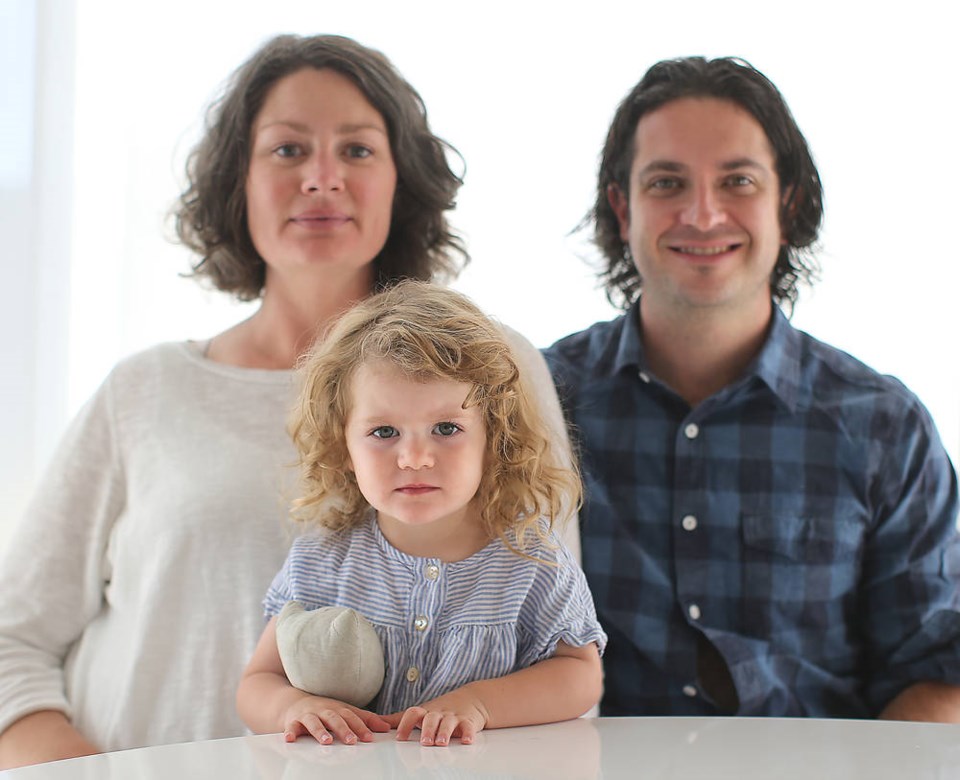Physically and emotionally drained after 30 hours of labour at home, Alison Strumberger remembers the stress of having to abandon her home-birth plans and deliver her child in hospital instead. The Victoria mom says the support of her husband and her doula made all the difference as she delivered her now two-year-old daughter Wren on Aug. 5, 2018.
“I can’t imagine not having had my doula there for the nearly 40 hours of labour leading to the birth of my daughter,” says the 37-year-old.
Now 33-weeks pregnant and due to have her second child in October, Strumberger is worried that if her home birth requires hospital intervention, her doula, Laura Warren, won’t be allowed in the delivery room.
Because of smaller birthing rooms, Victoria General Hospital is one of the few hospitals in B.C. that still prohibit birthing mothers from having a doula or secondary support person in the labour and delivery room. In March, Island Health limited the number of people who can accompany a woman in the delivery room to one per day in order to prevent the spread of COVID-19.
As the province entered Phase 3 of COVID-19 protocols, some B.C. hospitals have eased that restriction to allow a doula or another support person. Nanaimo General Hospital and hospitals in the North Island allow doulas, and Cowichan District Hospital also allows two support people during labour.
Doulas are allowed at B.C. Women’s Hospitals and all hospitals in the Fraser Health, Coastal Health, Providence Health and Interior Health regions, according to the Doula Services Association of B.C. In Northern Health, University Hospital of Northern British Columbia in Prince George allows doulas.
Doulas are trained to provide physical and emotional support to families during pregnancy, birth and post-partum.
Island Health said in a statement that it understands visitor restrictions “have been challenging for many and have resulted in sacrifices and difficult decisions.” The health authority said not all Island Health facilities are the same and a “quality council” responsible for labour and delivery looked at each hospital to determine how many support people can safely attend deliveries.
“Given the size of the birthing suite at Victoria General Hospital, it has been determined that the space can safely accommodate one support person,” the statement said.
In hospitals where doulas are permitted, they must display their doula certification ID, wear clear scrubs and clean shoes or booties upon arrival at the hospital and undergo screening for symptoms. The doula can only provide support during labour and delivery for vaginal births. They’re not permitted to visit the post-partum room or attend deliveries in the operating room.
Strumberger said having her doula present is just as important to her as having her husband, Nick Hadgelias, or midwife there. She said pregnant women are already facing additional uncertainty and stress due to COVID-19, especially since many prenatal-education classes have shifted from in-person to online. To take away a support that for some women is vital is asking pregnant women to sacrifice too much, she said.
“If my hospital support staff can leave work and go and sit on a patio … or go and shop in a grocery store, I have a really hard time understanding why I am the one who has to make the sacrifice,” said Strumberger, who works for a Victoria self-publishing company.
Jay Duncan of VIDA Doulas said that at a recent meeting with officials from Island Health and Victoria General Hospital, one health official raised the concern that if the hospital allowed doulas but not an additional support person, such as a family member, it would put women who can’t afford a doula at a disadvantage. The average cost of a doula in B.C. is between $950 and $1,200.
“It was making doulas out to be this bourgeois thing to have,” Duncan said.
However, Duncan said there are many programs that offer low-cost or free doula services to low-income women, such as the Doula for Aboriginal Families and Grant program offered by the B.C. Association of Aboriginal Friendship Centres, First Nations Health Authority and the Ministry of Health.
Duncan, who has been a doula in Greater Victoria for 17 years, said the nurses and doctors at Victoria General are fantastic, but their focus is on the baby, not the mother.
“We’re certainly not saying they would not have any support at that hospital. I know the nurses are fantastic, the midwives are amazing, too. But they also have a different role. My whole role is to completely focus my attention on the partner and the birthing person. Whereas the nurses and the midwives and doctors, they have all sorts of medical and diagnostic information that they have to adhere to.
“So they’re not going to be able to rub somebody’s back for two hours. Because doulas don’t have the obstetrical background or the obstetrical responsibility, our entire responsibility and focus is on the physical and emotional well-being of that birthing person and their family. That’s a piece that birthing people are now not getting.”
Duncan said many pregnant woman, as long as they’re not high-risk, are opting for home births in order to have their doula present.
“Our concern is that we’re depriving these Victoria birthing people of these supports,” Duncan said. “It will impact the care that birthing people have at the hospital.”



